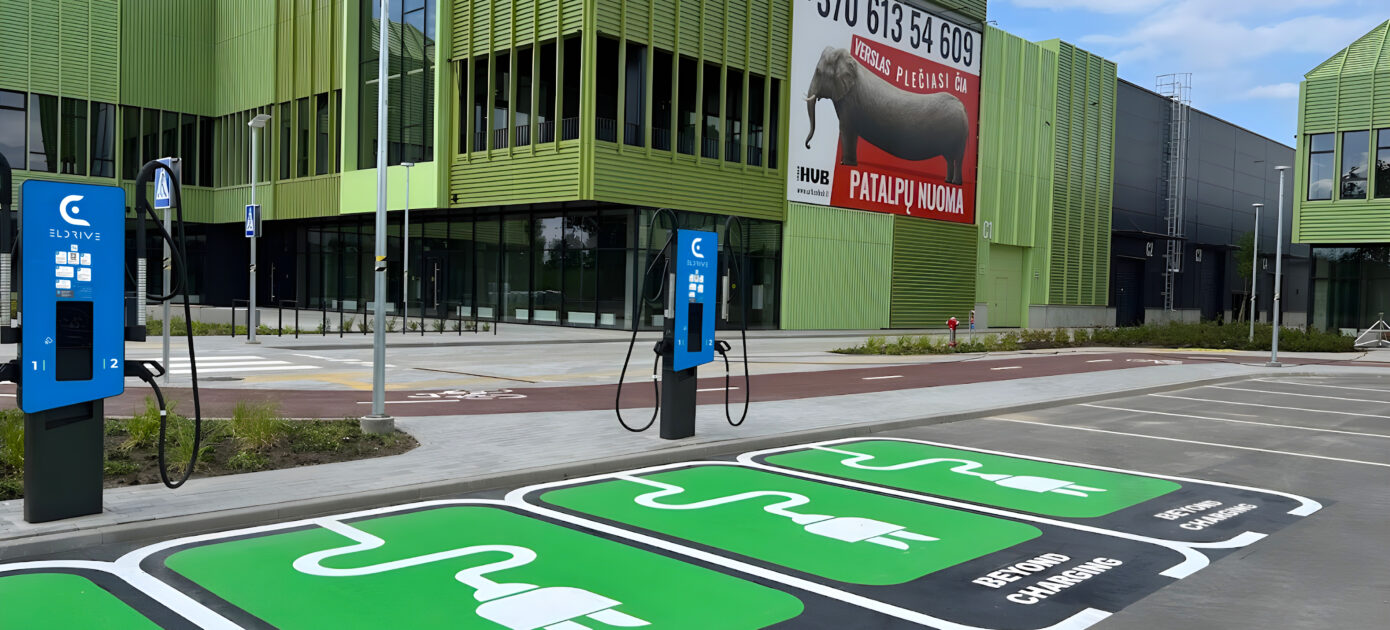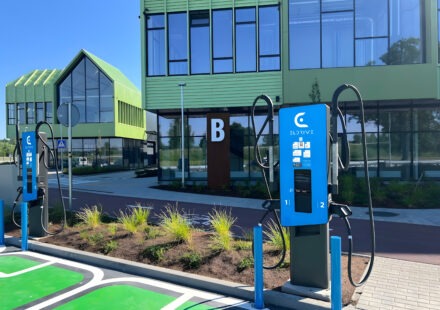The largest electric vehicle charging centre on the A1 motorway, next to the Urban HUB, has started operating

Eldrive, one of Lithuania’s biggest electric vehicle charging networks, has installed 13 electric vehicle charging stations near the Urban HUB project in Kaunas, which will be available to electric vehicle drivers starting Wednesday. 26 electric vehicles will be able to charge simultaneously. The total capacity of the stations in Kaunas is currently 650 kW.
According to the data from the Ministry of Transport and Communications of the Republic of Lithuania, currently, there are more than 13,000 electric vehicles on the roads in Lithuania, and the number of electric vehicles has increased by 59% over the last 12 months. ‘The installation of new charging stations and the expansion of infrastructure are contributing significantly to the increasing number of electric vehicles in our country’, says Tomas Tamašauskas, CEO of Eldrive Lithuania.
‘In the first stage of the SBA Urban project in Kaunas, we have installed 13 modern 50 kW charging stations, which can accommodate as many as 26 electric vehicles, and in Vilnius, we will installed 7 additional fast charging stations. We are delighted about this project with SBA Group and the opportunity to contribute to the expansion of modern charging stations in both Kaunas and Vilnius. It is encouraging that companies have a welcoming attitude to the development of electric vehicle infrastructure and are providing all the appropriate conditions for this to happen’, says T. Tamašauskas.
According to Rasa Pečiulaitė, Head of Real Estate Development at Urban HUB, the first stage of construction of the project with approximately 22,000 sqm of business premises is nearing completion. The second stage of the Urban HUB, covering an area of 26,000 sqm, was launched ahead of the schedule.
Upon the project’s completion, the Urban HUB will offer electric vehicle drivers a selection of 35 medium—and high-power stations conveniently located near the major A1 and A6 motorways in Kaunas and the A2 in Vilnius.
‘Real estate development is integral to sustainable mobility solutions. In the first stage, we install only a part of the charging stations for electric vehicles in the project’s shared parking structure with our partners. As the Urban HUB continues to expand, we plan to open one of the largest e-stations in Lithuania. We aim for the project to become an example of what an EV charging infrastructure should look like in the future – with green and recreational spaces, modern, convenient and, most importantly, easily accessible’, comments R. Pečiulaitė.
The second stage will add 7 charging stations to the Urban HUB car park in Kaunas, and in the future, the infrastructure will be complemented by eight ultra-fast charging stations in a new e-station.
Expansion is in a strategic location
The preferred location is also decisive in successfully expanding EV charging infrastructure. According to T. Tamašauskas, the project’s location in Kaunas, near the busy A1 motorway and the A6 road, will enable Urban HUB to become a sort of epicentre of electric vehicle charging.
‘Vilnius-Kaunas is one of the busiest motorways in Lithuania. The charging stations in the Urban HUB area will be an excellent location for drivers of electric vehicles to recharge their vehicles – whether commuting to Klaipėda or Jonava’, – explains Tamašauskas.
According to the speaker, there are currently only very few charging stations on the right-hand side of the motorway towards Klaipėda and around Kaunas: ‘There is a limited number of charging stations on this section of the highway, but the demand is enormous. The new charging station will now accommodate dozens of EVs at a time, allowing electronic vehicle drivers to feel secure when travelling anywhere’.
Selected 50 kW charging stations
T.Tamašauskas states that in the Urban HUB it was chosen to install 50 kW power charging stations considering the needs of drivers: ‘This location will attract both travellers passing through Kaunas and those who come here for shopping or work. A 50-kW power station, depending on the electric vehicle, can fully charge it in about an hour or an hour and a half. Of course, it is important to understand that the charging speed depends on the station and the maximum power the electric vehicle can accept. This means that the station could be 300 kW, but if the electric vehicle can only charge at 40 kW, that’s what it will be. But certainly, half an hour or an hour at the station would be enough to replenish the electric vehicle’s battery and continue the journey’, says Tamašauskas.
Eldrive indicates that Alpitronic’s charging stations will be operating at this location.






